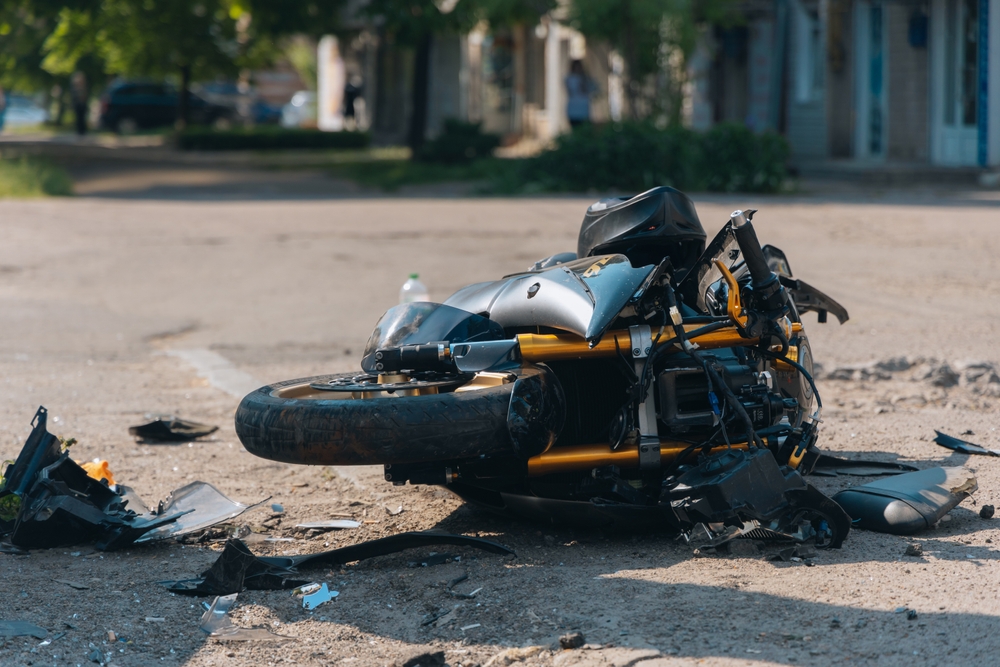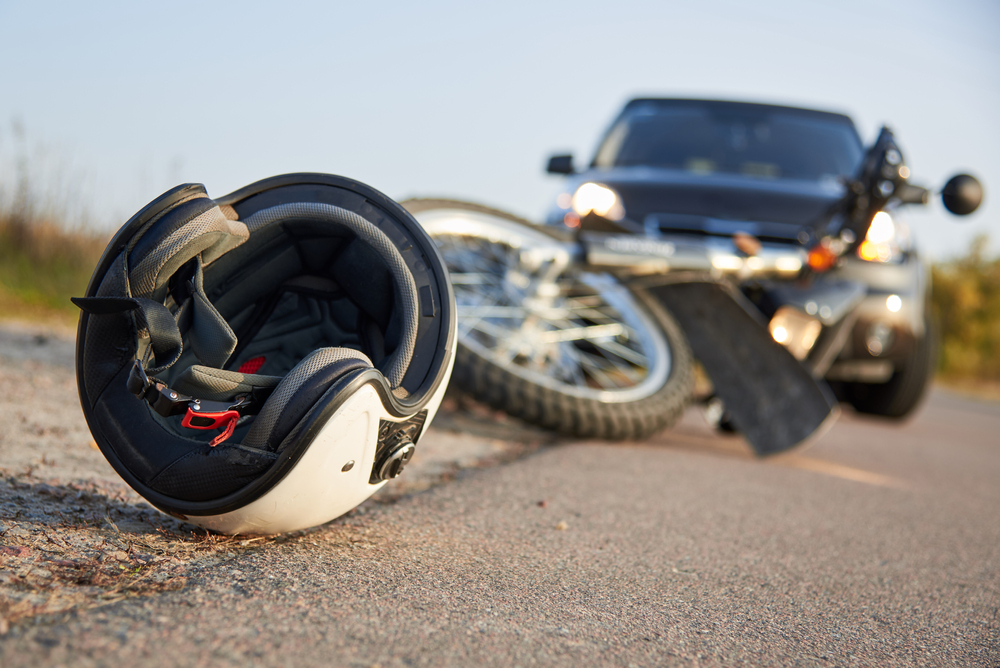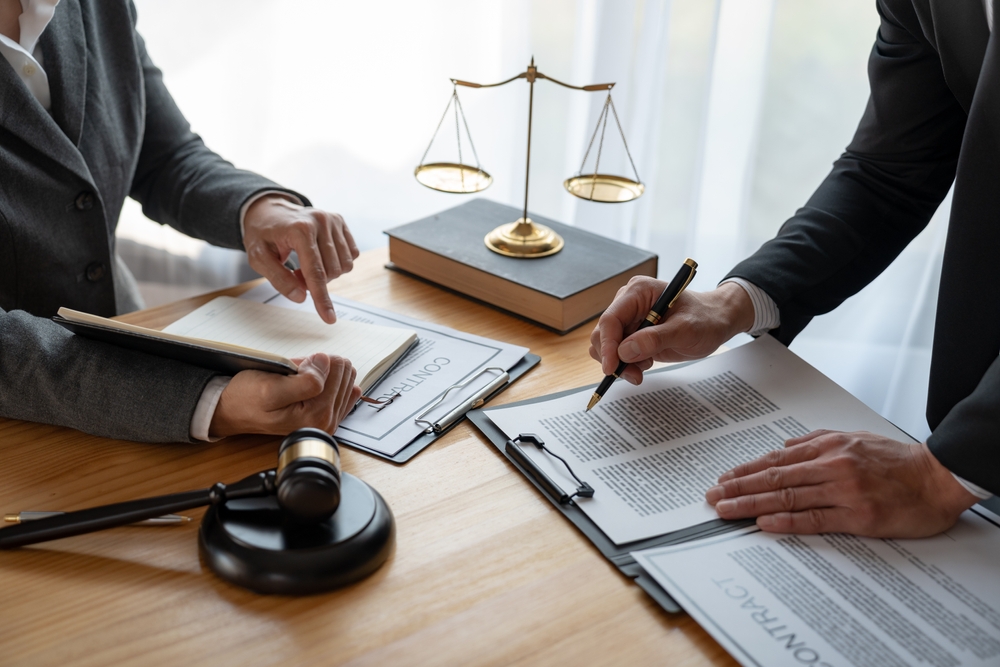To pass a motorcycle safely, other drivers must take several precautions. First, they should check blind spots thoroughly since motorcycles can be difficult to see. They must also signal their intention to change lanes well in advance and maintain a safe distance behind the motorcycle before passing, allowing extra space for sudden stops or swerves.
When overtaking a motorcycle, a driver should move into the adjacent lane entirely. Finally, they should return to their lane only when the motorcycle is visible in the rearview mirror.
When other drivers fail to pass motorcycles safely, serious accidents can occur. In some situations, the force of a collision may knock the motorcyclist off their bike, causing them to suffer serious injuries.
If you sustained injuries in one of these types of motorcycle accidents, a knowledgeable motorcycle accident attorney can investigate the circumstances, file a claim on your behalf, and pursue the financial compensation you deserve.
Types of Accidents That Can Happen When Drivers Fail to Pass Motorcycles Safely
Failing to pass motorcycles safely can lead to various types of accidents, each with potentially severe consequences. Understanding these types of accidents is crucial for improving road safety.
First, sideswipe collisions occur when a driver tries to pass a motorcycle without leaving enough space. This can happen if the driver misjudges the motorcycle’s position or attempts to share the lane. Sideswipes can cause the motorcyclist to lose control, leading to a crash that can be fatal due to the lack of protection for the rider.
Another common accident is a rear-end collision. Drivers may underestimate the motorcycle’s speed or the distance needed to stop safely. If a driver follows too closely and the motorcyclist has to brake suddenly, the driver may not have enough time to stop, resulting in a rear-end crash. These collisions can throw the motorcyclist off their bike, causing serious injuries.
Cutting off a motorcycle when changing lanes or turning is also dangerous. If a driver fails to check their blind spots and signals improperly, they may cut off a motorcycle, forcing the rider to brake suddenly or swerve to avoid a collision. This abrupt maneuvering can cause the motorcyclist to lose balance and crash or even be thrown into oncoming traffic.
A more severe type of accident involves “dooring.” This occurs when a driver or passenger in a parked car opens their door into the path of an oncoming motorcycle. The motorcyclist has little time to react, leading to a high-impact collision with the door, which can result in catastrophic injuries or fatalities.
In addition, forced off-road accidents happen when a car passes too close to a motorcycle, pushing it off the road. This scenario is especially hazardous on highways or roads with limited shoulders, as the motorcyclist may collide with barriers, trees, or other obstacles.
If you suffered injuries in one of these scenarios, an experienced motorcycle accident lawyer can promptly begin an investigation and advise you on your available options.
Injuries in Motorcycle Accidents That Result from Negligent Passing Maneuvers by Other Drivers

Motorcycle accidents resulting from negligent passing maneuvers by other drivers can lead to a wide range of injuries, many of which are severe due to the exposure of motorcyclists. Unlike car occupants, motorcyclists lack the protective shell of a vehicle, making them highly vulnerable to collisions.
Road rash: is the common injury in accident. When a motorcyclist is thrown from their bike during a collision, their body can slide across the pavement, causing severe abrasions. These wounds can vary in severity from minor scrapes to deep lacerations, potentially leading to infections or permanent scarring if not treated properly.
Fractures: are another frequent consequence. The impact from a negligent passing maneuver can cause motorcyclists to break bones in their arms, legs, ribs, or pelvis. These fractures can require extensive medical treatment, including surgeries and lengthy rehabilitation periods. Compound fractures, where the bone pierces the skin, are particularly dangerous and prone to complications.
Head injuries: are among the most serious outcomes of motorcycle accidents. Even with helmets, motorcyclists can suffer concussions, skull fractures, or traumatic brain injuries (TBI). TBIs can have long-lasting effects, affecting cognitive functions, memory, and motor skills. In severe cases, they can lead to permanent disability or even be fatal.
Spinal cord injuries: are another devastating result of motorcycle accidents. A forceful impact can damage the spinal cord, potentially leading to partial or complete paralysis. Such injuries often result in significant lifestyle changes and require lifelong medical care and assistance.
Internal injuries: are also a grave concern. The blunt force trauma from a collision can cause damage to internal organs such as the liver, kidneys, spleen, or lungs. These injuries may not be immediately apparent but can be life-threatening if not diagnosed and treated promptly.
Soft tissue injuries: including sprains, strains, and tears in muscles, ligaments, and tendons, are also common. While they may seem less severe than other injuries, they can still cause significant pain and limit mobility, requiring physical therapy for recovery.
How to Prove That Another Driver’s Unsafe Passing Maneuver Caused Your Motorcycle Accident

Proving that another driver’s unsafe passing maneuver caused your motorcycle accident requires gathering strong evidence and presenting a clear case. The following is a step-by-step guide to help you build your claim:
- First, gather physical evidence from the scene. Take photographs of the accident site, your motorcycle, the other vehicle involved, and any visible injuries you sustained. Capture skid marks, debris, and road conditions, as these details can support your account of the accident. If possible, obtain traffic camera footage or surveillance videos from nearby buildings which may have recorded the incident.
- Next, collect witness statements. Eyewitnesses can provide crucial, unbiased accounts of the accident. Get their contact information and ask them to describe what they saw, particularly focusing on the other driver’s actions. Police reports are also vital, as officers often include their observations and the statements of those involved, which can corroborate your version of events.
- Medical records play a significant role in proving your case. Seek medical attention immediately after the accident, even if injuries seem minor. Medical documentation of your injuries and the treatment you received can demonstrate the severity of the accident and link your injuries directly to it. Consistent follow-up care records will also help show the ongoing repercussions of the crash.
- Furthermore, detailed records of any damages and expenses incurred due to the accident must be kept. This includes repair costs for your motorcycle, medical bills, lost income, and any other out-of-pocket expenses. Financial documentation supports your claim for compensation and illustrates the accident’s tangible effects on your life.
- Engage an expert witness if necessary. Accident reconstruction specialists can analyze the evidence and provide a professional opinion about how the crash occurred. Their testimony can be particularly persuasive in demonstrating that the other driver’s unsafe passing maneuver was the primary cause of the accident.
- Finally, work with an experienced motorcycle accident attorney. They can help you navigate the legal process, gather evidence, and build a strong case. An attorney can also negotiate with insurance companies on your behalf to ensure that you receive fair compensation.
Negotiating a Favorable Settlement Offer in a Motorcycle Accident Case

An experienced motorcycle accident lawyer can be invaluable when negotiating a fair settlement with the at-fault driver’s insurance company. Here is how they can help.
First, an attorney thoroughly investigates the accident. They gather all relevant evidence, including police reports, witness statements, and medical records. This comprehensive documentation helps establish the facts of the case and shows the extent of your personal injury damages. With this evidence, your attorney can build a strong argument demonstrating that the other driver was at fault and the repercussions the accident has had on your life.
Next, the attorney calculates the full value of your claim. They consider all aspects of your damages, including medical expenses, lost income, property damage, and non-economic losses like pain and suffering. Experienced attorneys understand the tactics insurance companies use to undervalue claims, so they ensure that all your losses are accounted for and included in the settlement demand.
When negotiating with the insurance company, an attorney uses their knowledge and experience to advocate on your behalf. Insurance adjusters are skilled negotiators trained to minimize payouts. An experienced attorney, however, knows the legal and procedural nuances and can counter these tactics effectively. They present the evidence clearly and compellingly, highlighting the strength of your case and the liability of the at-fault driver.
Moreover, an attorney can handle all communications with the insurance company. This protects you from inadvertently saying something that could harm your claim. They manage deadlines, respond to requests for information, and negotiate assertively for a fair settlement. If the insurance company offers a low settlement, your attorney can reject it and provide a counteroffer supported by the evidence.
If the insurance company refuses to offer a fair settlement, an experienced attorney is prepared to take the case to court. The willingness to litigate often motivates the insurance company to offer a fair settlement rather than face the uncertainty and expense of a trial. Your attorney will represent your best interests throughout the legal process, whether in negotiations or in court.
A motorcycle accident lawyer's knowledge and advocacy can significantly increase the chances of securing a fair settlement that fully compensates you for your losses.
How Much Is a Motorcycle Accident Case Worth?
The value of a motorcycle accident claim or lawsuit can vary significantly depending on several factors. The damages you can recover generally fall into two categories: economic and non-economic damages.
Economic damages cover the tangible financial losses resulting from the accident. These include:
- Medical Expenses — These include all costs related to your medical treatment, such as hospital bills, surgery costs, medication, physical therapy, and future medical expenses if your injuries require long-term care.
- Lost Income — If your injuries prevent you from working, you can claim compensation for the income you lost during your recovery period. This also includes loss of earning capacity if your injuries affect your ability to work in the future.
- Property Damage — You can recover the costs of repairing or replacing your motorcycle and any other personal property damaged in the accident.
- Out-of-pocket Expenses — This includes any other expenses directly related to the accident, such as transportation costs to medical appointments and the cost of hiring help for household tasks you cannot perform due to your injuries.
Non-economic damages compensate for the more intangible effects of the accident. These include:
- Pain and Suffering — This compensation is for the physical pain and discomfort you have endured because of your injuries.
- Emotional Distress — Accidents can also lead to mental and emotional trauma, such as anxiety, depression, or post-traumatic stress disorder (PTSD). Compensation for emotional distress covers these effects.
- Loss of Enjoyment of Life — If your injuries prevent you from enjoying activities and hobbies you once loved, you can seek compensation for this loss.
- Loss of Consortium — This is compensation for the effects of the accident on your relationships, particularly if your injuries affect your ability to maintain a normal relationship with your spouse.
The total value of a motorcycle accident claim or personal injury lawsuit depends on the severity of your injuries, the clarity of the other driver’s fault, and the insurance policies involved. Minor accidents with low medical costs and quick recoveries may result in settlements of a few thousand dollars. In contrast, severe accidents causing long-term disabilities and extensive medical treatment can lead to settlements or verdicts worth hundreds of thousands or even millions of dollars.
An experienced motorcycle accident attorney can help you understand the potential value of your claim and ensure that you receive fair compensation.
Speak with a Knowledgeable Motorcycle Accident Lawyer Today

If you suffered injuries in a motorcycle collision that resulted from another driver's failure to pass safely, you should consult with an experienced personal injury lawyer right away. Your lawyer can review your legal options with you, answer your questions, and pursue the maximum amount of compensation you need to recover for your losses.







